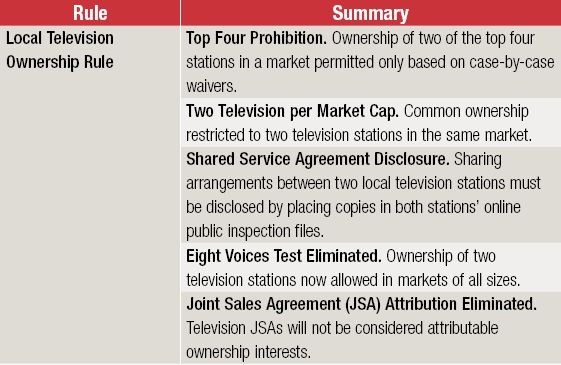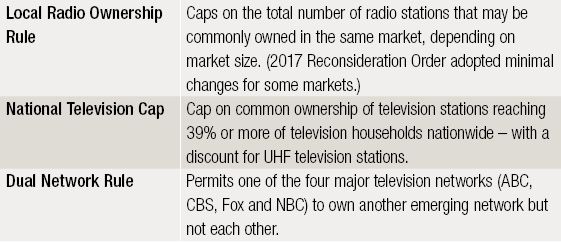- with readers working within the Aerospace & Defence, Property and Telecomms industries
On April 1, 2021, the U.S. Supreme Court unanimously ruled in favor of the Federal Communications Commission (FCC, or the Commission) in its appeal of the Third Circuit Court of Appeals' decision in FCC v. Prometheus Radio Project – thereby upholding the Commission's 2017 decision to repeal or modify a number of its broadcast ownership rules. Writing for the Court, Justice Brett Kavanaugh stated that the FCC's decision to repeal or modify three broadcast ownership rules, although based on a "sparse" record, was reasonable and thus did not violate the Administrative Procedure Act's (APA) prohibition on arbitrary and capricious agency decision-making.
The FCC's Broadcast Ownership Rules
Historically, the FCC has regulated ownership of broadcast licenses, with the goal of seeking to promote competition, localism and viewpoint diversity. Those rules have long included (1) prohibitions on owning a broadcast station (either radio or television) and a daily newspaper in the same market (the Newspaper/Broadcast Cross-Ownership, or NBCO, rule); (2) limits on the number of combined radio and television stations that a single entity may own in the same market (the Radio/Television Cross-Ownership, or RTCO, rule); and (3) caps on the number of television stations that a single entity may own in the same market (the Local Television Ownership, or LTO, rule).
Since the Commission adopted these rules decades ago, it has repeatedly sought to change its broadcast ownership rules due to changes in the broadcast media market, including competition from alternative media such as cable television and the Internet. Since 1996, the Commission has been required to review these rules every four (originally every two) years under Section 202(h) of the Communications Act to determine whether they remain "necessary in the public interest." In 2002, a Commission attempt to completely overhaul the ownership rules was appealed to the Third Circuit and ultimately overturned. Since then, the Third Circuit has retained jurisdiction over the Commission's continued attempts to modify the ownership rules, repeatedly overturning the FCC's decisions.
In its most recently completed quadrennial review in 2016, the Commission determined that the ownership rules remained necessary. On reconsideration in 2017 (the 2017 Reconsideration Order), however, the Commission (after a shift in majority following the 2016 election) reversed course by finding that the broadcast ownership rules were in some cases now obsolete due to the rapid technological changes in the media marketplace. Accordingly, the FCC determined that it was in the public interest to repeal the NBCO and RTCO rules entirely and to modify the LTO rule. The FCC explained that permitting consolidation of the broadcast industry in the face of increasing competition from new media technologies would benefit consumers. The Commission also noted that its changes to the broadcast ownership rules would not likely harm minority and female broadcast ownership.
Prometheus Radio Project and several other public interest groups petitioned the Third Circuit for review of the FCC's changes to the NBCO, RTCO and LTO rules – arguing that the FCC's decision was arbitrary and capricious under the APA because it did not fully consider the impact of those changes on female and minority ownership, something the Third Circuit had earlier told the FCC it needed to do. Specifically, Prometheus contended that the FCC relied on flawed data and ignored superior data available in the record in assessing the impact of the rule changes on female and minority ownership. The Third Circuit agreed with Prometheus and vacated the 2017 Reconsideration Order. The FCC and other industry groups appealed to the Supreme Court, which heard argument in January.
The Supreme Court's Opinion
The Supreme Court upheld the FCC's decision to change its broadcast ownership rules on the grounds that the agency is entitled to significant discretion in its decision-making in the face of an imperfect record. The APA's arbitrary and capricious standard requires agency decisions to be "reasonable and reasonably explained." The Court's review of the agency's decision is deferential and must only ensure that the agency acted within a zone of reasonableness – that the agency has reasonably considered the issues and explained its decision-making.
The Commission acknowledged that the record was sparse on evidence regarding the impact of its rule changes on minority and female broadcast ownership. The Court, however, concluded that neither the APA nor Section 202(h) of the Communications Act required the FCC to conduct its own studies or fact-finding to supplement an imperfect record. Rather, it was sufficient that the FCC made a "reasonable predictive judgment based on the evidence it had." In other words, perfect empirical or statistical data was not necessary for the agency to render its decision – so long as the decision was reasonable based on the evidence before the Commission.
The Court explicitly stated that it was not addressing whether Section 202(h) of the Communications Act required, or even allowed, the FCC to consider minority and female ownership in determining whether any proposed rule changes were necessary in the public interest. In a concurring opinion, however, Justice Clarence Thomas emphatically stated his belief that Section 202(h) places no obligation on the Commission to consider whether broadcast owners as a group are diverse. Rather, according to Thomas, the Commission created its ownership rules to protect diversity in the viewpoints presented by broadcasters, as part of its historic focus on "consumers, not producers." Under Thomas' view, ownership diversity, if considered at all, should be seen as a way to achieve viewpoint diversity, not as a goal in itself.
Finally, the Court reversed the Third Circuit's decision to vacate the Commission's separate 2016 and 2018 decisions concerning the broadcast incubator program, which was designed to encourage new entrants in the broadcast industry. The Court noted that the Third Circuit failed to provide any independent reasons for doing so – only that these decisions were being vacated because the Commission failed to consider ownership diversity in the 2017 Reconsideration Order. Since the Court was reversing the reasoning behind the Third Circuit decisions as to the 2017 Reconsideration Order, the Court concluded that the reversal of the Third Circuit's decision concerning the incubator program logically followed.
Impact on Broadcasters
The Supreme Court's decision will benefit at least some broadcasters by allowing them to consolidate their resources in the face of increasingly significant competition from newer media technologies such as streaming services. Furthermore, the reinstatement of the broadcast incubator program may aid the expansion of the broadcast industry by encouraging new and diverse entrants supported by larger, experienced broadcasters, at least in radio, where larger owners may now receive waivers of the local radio ownership caps in return for incubating new entrants.
The Court's decision, however, does not eliminate ownership restrictions on broadcasters in their entirety. The following table summarizes the FCC's broadcast ownership rules currently in effect following the Court's decision in Prometheus (as well as those that are now being eliminated).



We expect additional guidance from the FCC in the near future regarding implementation of these rule changes and any additional changes that may be required to various FCC forms (which frequently require certifications as to compliance with the ownership rules).
We also expect that this is not the last we will hear from the FCC regarding its ownership rules. Indeed, the FCC's 2018 quadrennial review remains ongoing.
Authorship Credit: Daniel Kirkpatrick, Davina Sashkin and Keenan Adamchak
The content of this article is intended to provide a general guide to the subject matter. Specialist advice should be sought about your specific circumstances.



